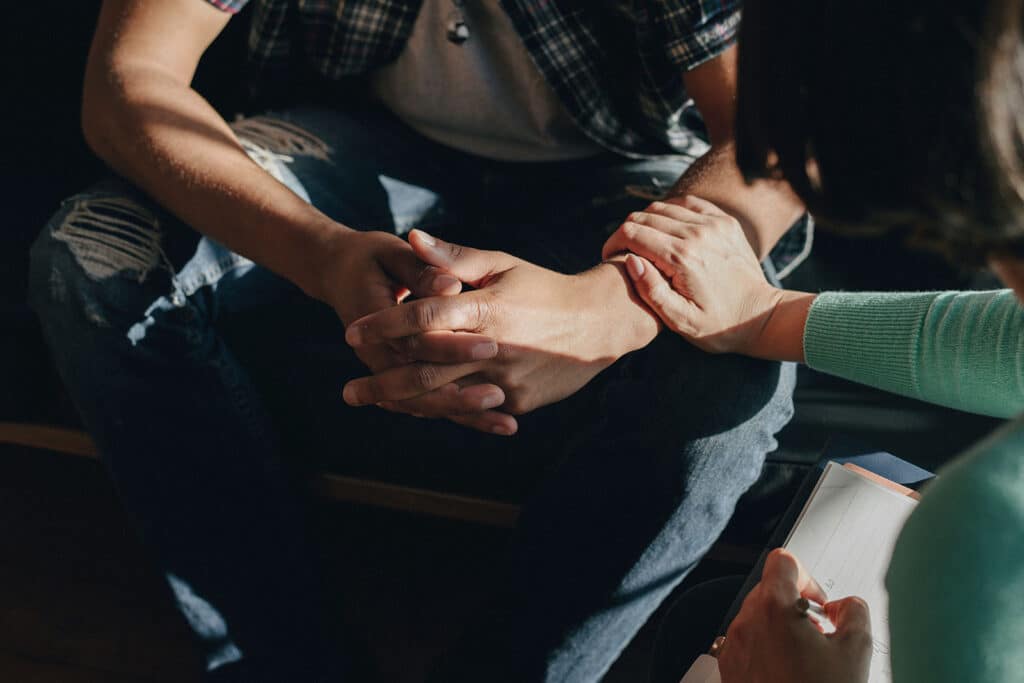Are you seeking a comprehensive yet flexible addiction treatment program that provides real results? The Evening Intensive Outpatient Treatment Program could be the ideal choice for you. Designed to work around your schedule, the evening IOP program effectively addresses addiction issues and mental health concerns without needing overnight stays or long-term commitments.
But what does an evening intensive outpatient program entail? And how can it benefit those seeking a way out of their addiction? Here, we take a look at the benefits of Evening IOP and why this type of program might be the right choice for you or your loved one.
Table of Contents
- What is an Evening Intensive Outpatient Program?
- Different Disorders Treated in Evening IOP
- Difference Between a Standard Intensive Outpatient Program and an Evening Intensive Outpatient Program
- What Does an Evening IOP Provide?
- Individual therapy sessions
- Group therapy sessions to foster meaningful conversations among peers
- Family therapy as a support system
- Medication-assisted Treatment Program
- Cognitive-Behavioral Therapy (CBT)
- Skills Development Classes to build healthy habits
- Meditation and mindfulness activities to promote healing
- Relapse prevention strategies
- Supportive resources for aftercare planning
- Choosing Between an Inpatient and Intensive Outpatient Program
- Why Many New Yorkers Are Choosing Intensive Outpatient Programs to Help Them Overcome Addiction
- Evening Intensive Outpatient Rehab Program- Is It Right for You?
- Bottom Line
What is an Evening Intensive Outpatient Program?
The Evening Intensive Outpatient Program (EIOP) is a comprehensive outpatient addiction treatment program that takes place in the evening. An evening IOP offers individuals who need professional help with addiction and mental health concerns the opportunity to establish long-term sobriety by providing education, support, guidance, and structure during the evenings so that individuals don’t have to disrupt their everyday life while they engage in treatment for drug abuse.
Duration
The duration of evening intensive outpatient programs varies from 3 to 6 months based on the participant’s requirements. Such treatment involves attending therapy sessions multiple times weekly and is less intense than inpatient treatment. Hence, individuals can receive treatment while living at home or in a sober living environment.
Level of Care
The intensive outpatient program falls between the outpatient level of care and a residential treatment program. It is higher than an outpatient program but typically less intensive than a partial hospitalization program (PHP) or residential treatment.
It is a step up from traditional outpatient treatment, offering more hours of programming in the evening throughout the week, and a step down from residential treatment, which requires individuals to stay overnight for days or weeks. This level of care is beneficial for those who need more comprehensive treatment but cannot commit to a longer residential program.
Different Disorders Treated in Evening IOP
The Evening Intensive Outpatient Program is an excellent choice for various disorders. These include, but are not limited to:
- Substance abuse disorder
- Alcohol use disorder
- Co-occurring mental health issues such as depression and anxiety
- Bipolar disorder
- Dissociative disorders or borderline personality disorder
- Schizophrenia
- Post-traumatic stress disorder (PTSD)
- Eating disorders
- Stress-related disorders

Difference Between a Standard Intensive Outpatient Program and an Evening Intensive Outpatient Program
The main difference between a Standard Intensive Outpatient Program (IOP) and an Evening Intensive Outpatient Program (EIOP) is the time of day when services are provided. While traditional IOP programs typically occur during the day, Evening IOP occurs in the evening to accommodate those needing more intensive treatment but cannot commit to a longer residential program.
Another difference between the two programs is that Evening IOP usually provides more hours of programming per week. This can help participants gain greater support and guidance throughout their recovery journey while still maintaining their work, school, or family commitments.
Lastly, the Evening IOP program has a component called medication-assisted treatment (MAT) which helps individuals cope with physical and psychological symptoms related to addiction. While not all evening outpatient programs offer this, those who do are greatly appreciated by those seeking help overcoming addiction.
What Does an Evening IOP Provide?
The Evening Intensive Outpatient Program provides a comprehensive range of treatment services and activities to help individuals in their recovery journey. These may include:
Individual therapy sessions
During individual therapy sessions, participants can work on developing personal coping strategies and setting goals that will help them in their recovery journey. Personalized treatment plans are created to address the unique needs of each individual, taking into account any mental health issues or co-occurring disorders that may be present. The best part about individual therapy sessions is that your therapist will provide you with a safe space to talk openly about anything on your mind.
Group therapy sessions to foster meaningful conversations among peers
In group discussions, participants will learn from one another while developing communication skills by sharing their thoughts, feelings, and experiences in a safe and supportive environment. During group therapy sessions, participants can gain insight into their own behaviors and from other group members who are going through similar issues.
The focus of these sessions is on developing positive coping skills, problem-solving strategies, and healthier habits that will lead to long-term recovery success.
Family therapy as a support system
Family involvement is an essential part of the Evening IOP program. Family therapy sessions are available to provide education, guidance, and resources for family members. These sessions help families understand addiction and mental health issues, learn skills to support recovery and foster stronger relationships between loved ones affected by addiction or mental health concerns.
Medication-assisted Treatment Program
The Evening IOP program also includes a medication-assisted treatment (MAT) component to help individuals manage any cravings or withdrawal symptoms they may be experiencing. This is important because it can make the recovery process more manageable by relieving uncomfortable physical and psychological symptoms often accompanying addiction.
MAT involves using FDA-approved medications, such as buprenorphine and naltrexone, to reduce cravings for alcohol or drugs and keep individuals stable in their recovery. It also helps people stay focused on treatment goals and improve adherence to the program.
In addition to medication management, MAT also involves counseling and other behavioral health therapies to help individuals manage their addiction.

Cognitive-Behavioral Therapy (CBT)
CBT is an effective form of evidence-based therapy that helps individuals understand and change their thoughts and behaviors by identifying unhealthy thought patterns or beliefs that may be contributing to their addiction issues. Through structured sessions, the therapist helps them to modify their thought processes to change their behaviors and gain better control over their cravings.
CBT also teaches individuals how to manage stress and cope with triggers that may lead to relapse. By helping patients develop healthy coping skills, they can learn how to navigate difficult situations without turning to drugs or alcohol to deal with their problems.
Skills Development Classes to build healthy habits
The evening IOP program also includes skills development classes, which are designed to help participants develop the necessary tools and knowledge that will enable them to maintain healthy behaviors in their daily life. These classes can include time management, communication, goal setting, stress management, and more.
Meditation and mindfulness activities to promote healing
Mindfulness and meditation are essential components of recovery that can help individuals better manage stress, reduce cravings, and promote healing. During Evening IOP sessions, participants can learn effective mindfulness techniques to help them stay centered and connected with their inner selves to cope with difficult situations, reduce stress, and cultivate self-awareness.
Meditation provides an opportunity for self-reflection and encourages a sense of calmness and peace that helps individuals stay focused and better manage their emotions.
Relapse prevention strategies
These strategies involve early identification of high-risk situations and developing coping skills to manage them effectively. Through various sessions, participants can learn how to recognize warning signs of relapse and create an action plan to address challenges that may arise in recovery.
Participants engage in positive activities to keep them busy and avoid triggers that could lead to the use of drugs or alcohol. Additionally, participants can learn how to set goals, identify problem areas, and develop healthy habits to help them stay on track with their recovery.
Supportive resources for aftercare planning
The Evening IOP program helps individuals to develop their aftercare plans as part of their recovery journey. The team of clinicians works with each individual to create an aftercare plan tailored and comprehensive for the needs of each person. This includes developing a set of resources, such as connecting individuals to healthcare providers, transitioning into sober living homes or other support systems, and engaging in ongoing recovery support programs.
Referrals may also be made for in-person drug rehab in New York or online 12-step programs to help the individual stay on track with their recovery goals.

Choosing Between an Inpatient and Intensive Outpatient Program
The decision to seek treatment for substance abuse is essential, and it can be challenging to sort through all the available options. Although inpatient and intensive outpatient programs are similar in many ways, there are a few key differences between the two.
Inpatient rehab
- Most inpatient programs last between 30 and 90 days.
- Inpatient rehab programs provide 24-hour care in a residential setting, which can benefit individuals who need help dealing with more severe symptoms of addiction or mental health issues.
- This program provides a safe and supportive environment for individuals to focus solely on their recovery without the distractions of everyday life.
- Inpatient programs are generally a better fit for individuals with a severe addiction to opioids, cocaine, and other hard drugs than intensive outpatient programs. This is primarily because inpatient programs offer medication-assisted detox to help individuals cope with severe withdrawal symptoms brought on by the abrupt cessation of drugs or alcohol.
Intensive Outpatient Program
- On the other hand, intensive outpatient programs (IOP) offer a more flexible alternative that allows individuals to continue working, attending school, or taking care of family while still receiving treatment.
- Intensive outpatient programs generally last six months to a year and require individuals to spend 10 to 12 hours in weekly treatment.
- Since individuals do not have to remain onsite, addiction recovery treatments in an intensive outpatient program are far less expensive than treatments in an inpatient program.
When deciding between an inpatient and intensive outpatient program, it is essential to talk with a healthcare professional who can help determine what type of care will be best for you or your loved one’s individual needs. With their guidance, you can make an informed decision that will provide the best chance for a successful recovery.
Why Many New Yorkers Are Choosing Intensive Outpatient Programs to Help Them Overcome Addiction
The Evening Intensive Outpatient Program can help individuals build upon the knowledge they have already gained about addiction in a partial hospitalization program or during residential treatment. It is designed to give them more intensive care and support than an outpatient program while still allowing them to maintain their current lifestyle.
Benefits of Evening IOP
There are several benefits that come with an Evening Intensive Outpatient Program. These include:
- Greater emphasis on psychotherapy sessions, such as dialectical behavioral therapy (DBT) and cognitive behavioral therapy (CBT), to help individuals recognize the harmful behaviors that caused them to abuse drugs or alcohol.
- It helps individuals overcome mild addictions that do not require detox or round-the-clock monitoring.
- It provides a supportive environment where individuals can work through their issues individually or in groups.
- A flexible program that allows clients to attend as many or as few sessions as they need without having to disrupt their daily lives while doing so.
- The guidance and support of experienced professionals who can provide personalized care and help participants develop healthy habits that will last long after they complete the program.
- It is a comprehensive approach that addresses addiction and any underlying mental health disorders that may be present.
- The ability to remain connected to peers and support systems in the same program who can provide additional encouragement and guidance throughout recovery.
- The ability to receive help with vocational training, housing, employment, and other life skills that can help individuals stay sober while still functioning in society.
- Evening IOP allows the freedom to earn a living and maintain close ties with people they love while simultaneously working on trying to achieve sobriety.

Evening Intensive Outpatient Rehab Program- Is It Right for You?
An Evening Intensive Outpatient Program may be the best option for individuals who need more comprehensive treatment but cannot commit to a residential program. With its flexible schedule and extensive programming, Evening IOP provides an effective way to make meaningful changes without sacrificing other commitments. With the support of experienced clinicians, individuals can work towards their recovery goals in a supportive and safe environment. Healthcare professionals provide personalized care based on individual needs, helping participants gain real results from treatment.
If you are looking for an intensive outpatient program that fits your lifestyle, an Evening Intensive Outpatient Program may be the best option. With its flexible schedule and comprehensive programming, Evening IOP can help you make meaningful changes to your life while still maintaining other commitments. By providing personalized care and support from experienced clinicians, individuals can gain real results from treatment and move forward in their recovery journey.
This program has revolutionized addiction treatment and is an excellent option for anyone needing more intensive care without staying overnight or committing to a long-term program. It can be the answer you need to take control of your life and start on the path towards recovery.
Bottom Line
Evening intensive outpatient programs offer an excellent solution for those seeking help for addiction or mental health issues. The benefits and possibilities this type of program offers are evident – the flexibility, cost-effectiveness, and individualized focus make it appealing to individuals and their families when trying to support recovery.
Long Island Treatment Center’s Evening Intensive Outpatient Program is designed to provide a comprehensive yet flexible approach to recovery. By combining evidence-based treatments with experienced professionals, the Evening IOP program can help individuals in their journey of recovery and establish lasting sobriety. For those looking for reliable sources of care and support in New York, Long Island Treatment Center can be a great choice.
Investing in yourself is one of the most rewarding things you can do! Don’t wait any longer. Take the first step towards lasting sobriety today. Contact Long Island Treatment Center in New York and begin your recovery journey with Evening IOP near you!
FAQ
What is an Evenings Intensive Outpatient Program (EIOP)?
Who should consider joining Evening IOP?
How long are most IOP programs?
What is the IOP process?
What happens after you complete an IOP program?

